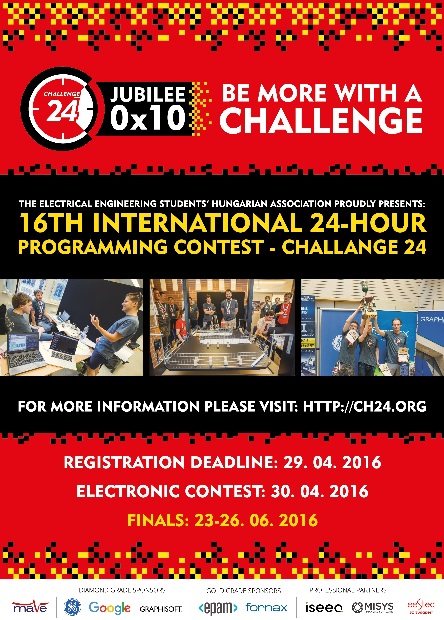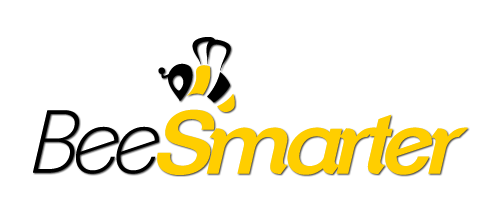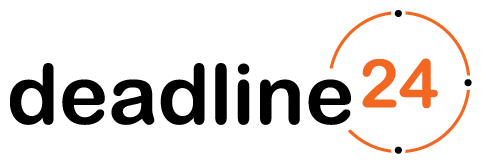Introduction
The International 24-hour Programming Contest, also known as Challenge24, is held every year in Budapest on the last weekend of June or the first weekend of July.Teams of three solve complex programming, artificial intelligence and mathematical problems during the 24 hours of the final round. Challenge24 is one of the few contests where participants are free to choose their tools, platforms and programming languages, and problems are presented only using open file formats.
Solving the problems requires a diverse set of skills including artificial intelligence, algorithm theory, mathematics as well as a background in physics or engineering. Besides the ability to produce working code in short time, good team work and efficient communication are necessary to take up the challenge. Since the tasks are solved under heavy stress, stamina is also an important component of a successful team.
History of Challenge24
Challenge24 started as an invite-only competition with twenty teams in 2000 but rapidly grew into one of the biggest open programming competitions in Europe, attracting hundreds of teams each year. During the past 16 years about 8500 people participated in the challenge.The 1st 24-hour Programming Contest was held in 2000. 33 teams applied from different universities in Hungary. 20 teams were accepted to compete on-site due to the financial limits. The problem was to create an autonomous soccer team.
The 2nd contest presented a more spectacular problem: the contestants had to design, implement, upload and test LEGO robots. The main problems: systematic mapping of a labyrinth, visual recognition, dance, LOGO interpreter creation.
The 3rd contest was raised to an international level. There were applicants for the selections even from Hong Kong and Uruguay. The first part of the problem was related to semiconductors: to write a program that can create integrated circuits. In the second part programmers had to create a software agent with some artificial intelligence, that is able to play a simple strategic game.
For the 4th contest 39 countries participated with 245 teams - form Columbia to Kuwait. Some creative problems: navigation across a virtual terrain, managing an oil-company, driving an assembly line robot and programming for secret communication.
The 5th contest opening was attended by the minister of informatics and communications and the vice-rector of Budapest University of Technology and Economics. The problems were mainly from the field of programming mobile devices. The stress was on problems with sound- and shape recognition, and also game development. The contestants had to display a 3D labyrinth, and to write a simple strategic game.
The 6th BME-KTH 24-hour Programming Contest was held between 21th and 23th April 2006. 309 teams registered, and after the electronic contest 30 of them were invited to the finals. Participants arrived from as far as Texas. The main attraction was a model speedway built in the IT building of the BME. They controlled the cars from the computers through a network. The winner was chosen in an elimination tournament.
For the 7th BME International 24-hour Programming Contest even more teams registered and at the 8th contest had participants from 41 countries all around the world. The problems of this year were mainly related to the field of artificial intelligence.
More than 1000 people participated at the 9th contest. They represented altogether 370 teams in the first round. In this year the final event gained particular attention from the press.
At The 10th BME International 24-hour Programming Contest were 41 teams, on third from Hungary, another third from the EU. Participants came from every continent of the world.
The 11th BME International 24-hour Programming Contest had 530 teams from 54 countries. Most problems were hardware specific, which made the competition spectacular for the audience as well. At the opening ceremony the rector of BME University, and at the closing ceremony the CEO of SAP, our main sponsor gave a speech.
The 12th competition in 2012 had 398 teams from 42 countries, making Challenge24 one of the largest programming competitions in Europe, well known all around the world. Extreme challenge, both for the body and the mind, make this contest popular.
The 13th competition in 2013 had 402 teams from many countries.
Challenge24 is well recognised by contestants whose positive experiences of the event contribute to the popularity and prestige of the contest among programmers worldwide. Extreme challenge, both for the body and the mind, make this contest popular.
As a result, the finest programmers of the world assemble every spring to compete in Hungary, Central Europe.
Organizing Challenge24
Finalists are most interested in a challenging problem set, but that alone is not enough - all other aspects of the event must also run smoothly.The Electrical Engineering Students' Hungarian Association (MAVE) embraced the contest right from the beginning, concentrating on operative parts. The association was founded in 1986 with the aim of assisting the professional development of university students, helping them expand their boundaries. As a non profit organization we have been building contact between students and the industry for decades. Social responsibility is most important for us. We would like to help future engineers to become the best of the best.
Our members learn a lot during the contest: there are a lot of operative tasks which require them to contact and communicate with contestants and sponsors. They also learn how to adapt the contest to current technological and social trends.
Besides operative aspects, organizing the contest also offers a professional challenge. The problem set is developed by a specialized team. Being part of this team is prestigious - working on the problem set is a special engineering challenge. The team is working from year to year to fill the 24 hours of the final round with extremely difficult and entertaining problems for the best of programmers.
Arranging those 24 hours for the finalists takes about 3/4 of a year of hard work for the organizers; preparation starts as early as September in the previous year. While building on traditions, the team is working on improving Challenge24 each year.
Structure of the contest
Registration and schedule
Contestants may register on the official web site (http://ch24.org) from early of December up to the Thursday before the EC. The following rules apply:- anyone may register;
- only teams of 3 registered members may participate;
- registered users need to upload their CV before the first round (EC).
Pre EC
The Pre EC (Preliminary Electronic Contest) is an optional event without any consequence later in the contest. The purpose of this event is to provide a test run for the contestants to get familiar with the structure of the contest and the submission system. This often includes:- setup and tuning for the team infrastructure;
- practice with the possible time zone difference;
- usage of the submission system by solving an easy problem set;
- performing the research for being able to process all the (open) file formats that may be used during the EC.
Thus the Pre EC is especially important for programmers who are new to the contest - to decrease the difference in Challenge24-specific experience between them and members of returning teams.
Electronic Contest (EC)
The EC is the online qualification round for the finals, normally held in February. The problem set is accessible from 10 AM (CET) and submissions are accepted by the web based scoring system during the five hours that follow. Teams are presented with usually 6 or 7 problems, with 10 inputs for each problem. Solving a task normally takes an experienced contestant about 20 minutes to 2 hours. The best 27 teams of the EC qualify for the finals. The best 3 teams of the previous year's finals are invited automatically - to make 30 teams total. If a team turns down their invitation, the best uninvited team (28th, 29th, etc.) gets an invitation.Finals
The finals of the International 24-hour Programming Contest is a three days long event held on the weekend closest to May 1st.Teams arrive on Friday, they proceed with the registration and receive their welcome pack and PR material. After deployment they are encouraged to test the network infrastructure of the final round. There are optional events (sight seeing, dinner) organized on Friday.
On Saturday the event starts at 8 AM with breakfast, followed by the opening ceremony at 8:30. The ceremony includes the presentation of a summary of the rules and speeches by the representatives of the sponsors.
The ceremony ends with the official start of the clock at 9 AM. The teams get a printed copy of the problem set, and the submission system is opened.
Sunday morning, 6 AM the traditional morning exercise takes place - participating in the session is mandatory for all contestants.
During the contest, the state of some interactive problems (e.g. games) is usually shown on projectors. Contestants and guests can follow the battle for scores in the most spectacular problems. The subject hardware of the hardware control tasks are often placed in the same area, allowing interested parties to follow the most exciting online tasks in real time.
Meals are served every 3-4 hours during the finals.
Submissions are accepted until 9 AM Sunday. The award ceremony follows at 11 AM, and a reception and lunch at 12 AM.
Book of Challenge24 (2000-2005)
With the help of the book on the 24-hour competition, everyone will have a chance to get prepared for the next Extreme Challenge. The book contains not only the first five contests' complete Problem Sets with the additional electronic materials, but also gives a better understanding to the reader through background stories, submissions and tips&tricks. It begins with a brief overview of the Challenge24 history and introducing the organisers. Interviews with the founders and the best teams can also be found along with pictures, videos and many more.
The problems are related to the field of algorithm theory, information and coding theory, databases, computer networks, computer graphics, software ergonomy, control theory and artifical intelligence. Use it as preparatory or educational material, at home or in class, you will be given great new ideas and have a lot of fun. Recommendation by Dr. Sc. Péter Arató, Dean of the BME EEI Faculty (2001-2005)
Marx, Benedek: International 24-hour Programming Contest; Problem Sets 2000-2005
Panem Publisher 2006, A4 format, 233 pages, paper cover, supplementary DVD-ROM
ISBN 963-54-5460-0
Do not hesitate, order it now at info13 (AT) ch24 (DOT) org !
Now with 15% discount, only for 13EUR + shipping
Are you interested?
Look around at the archive section.







